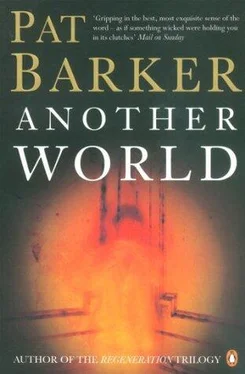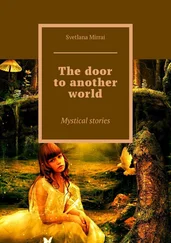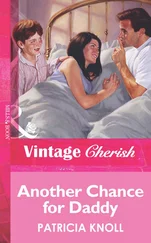‘What about him?’
No reply. After a few minutes Geordie’s breathing slows and Nick risks a sideways glance. At first he thinks he’s asleep, the eyes are white slits in his grey face and his mouth’s fallen open. But then the tip of a purple tongue appears and runs round the pale lips. He says, and the words cling to his dry mouth, ‘I killed Harry.’
Nick turns towards him. It’s not true of course, it’s obviously a delusion, but there’s no denying the reality of his despair. He grasps his cold hand, but, after a few moments, Geordie wriggles his fingers and gently, almost apologetically, takes the hand away.
Next morning, standing in the kitchen with his hands clasped round a cup of coffee while Frieda unpacks her shopping bag, Nick’s able to imagine he’s back in childhood. The events of last night are blurred with sleep. Geordie’s in the living room, talking about what he wants for his breakfast. He looks forward to meals eagerly, though he never eats much. He can’t be bothered to go all the way upstairs again, he says, so he gets washed stripped off at the kitchen sink, and this too produces a flood of memories, for Geordie always washed like that at the kitchen sink, bluthering and spluthering the soap around his face, digging powerfully into his ears with his fingertips, his face emerging blind and pink from behind the towel. Off to the working men’s club, usually. Not to the British Legion — when Nick was growing up he’d still been avoiding that. Always wore a buttonhole when he was going out, a yellow rose or a carnation. Replaced once a year, without comment, by a poppy that appeared and disappeared.
Nick goes into the living room and sits on the arm of the sofa, while Grandad chases his food around the plate, saying, ‘Nice bit of bacon, this,’ though most of the nice bit of bacon’s still on the plate when eventually he stops pretending and pushes the tray away. He lies with his hands pressed against the swell of his stomach, clasping the bulge from the sides. Many of his gestures echo Fran’s. Life growing inside one belly; death in the other. A banal reflection, Nick thinks, ashamed he can’t push his thoughts beyond the banal. The truth is he’s just too bloody tired. The supply of emotion’s run out.
Before he leaves he rings Helen and arranges to meet her outside the University library at ten o’clock. She’s waiting for him under the sin tree, where student smokers go to smoke, sitting quietly on the low stone wall. He bends down and kisses her.
‘How is he?’
‘Pretty bad.’ Now that he’s away from the house, Nick’s more aware of how deeply last night had shaken him. He sits beside her on the wall, hands dangling between his knees. ‘He said he killed Harry.’
Her expression doesn’t change.
‘I wondered if he’d said anything to you?’
‘Harry wasn’t his favourite topic’
‘No, I noticed that. Couldn’t change the subject fast enough, could he?’
‘What exactly did he say?’
‘Just that. “I killed Harry.”’
‘What sort of state was he in?’
‘When he said it? Confused, frightened. He’d been wandering about half the night, on patrol. I got him back to bed — he obviously didn’t know who the hell I was — switched the light out. I thought he’d gone to sleep, and then — no warning — out of the blue — “I killed Harry.”’ Nick can’t stop himself sounding aggressive, as if this is her fault. ‘I’m sorry, it’s —’
‘What do you want me to say, Nick?’
‘O-oh, that he’s reshaping his memories to fit in with current myths and assumptions about the war?’ His smile fades. ‘I want you to tell me it didn’t happen.’
‘I can’t tell you that.’
‘Or anything else either?’
‘It was off the record. I promised I’d destroy the tape.’
‘And did you?’
‘Yes.’
‘I just want to know whether I’m dealing with a senile delusion or —?’
‘Or what?’
‘You tell me.’
‘If it is a delusion, it’s still his reality.’
‘Yes, but it doesn’t have to be mine. For God’s sake, Helen, I spent part of last night crawling on my hands and knees across bloody No Man’s Land.’
Load of pretentious crap, he thinks a second later. He’d been nowhere of the sort.
Helen says, ‘Why don’t you ask him?’
‘All right,’ he says, standing up. ‘I will.’
‘Have you time for a coffee?’
‘No, I’d better be getting back.’
She nods. As he walks back to his car, he calls over his shoulder, ‘I don’t believe you destroyed the tape.’
On the drive back he’s chasing possibilities round and round his mind. Everything from a persistent delusion sparked off by survivor’s guilt to actual murder. What better place for that than on the Somme? Though he doesn’t believe it for a second, he knows Geordie too well.
Fran’s just setting off for the shops when he gets back, and hands Jasper over to him with relief.
‘You been a bad lad?’ Nick asks, nuzzling his neck. Jasper smiles shyly and hides his face.
‘No, he’s all right,’ says Fran. ‘It’s Gareth, I don’t know what’s got into him.’
The shoe box lies in the back of the cupboard, old sweaters piled on top of it, out of sight, buried.
But Gareth knows it’s there. It’s a bit like Raiders of the Lost Ark when the Ark’s in the hold of the ship and everybody’s laughing and talking, but then it starts humming and burns a hole in the crate. Gareth wouldn’t mind if the shoes burnt a hole in the box; be even better if the box burnt a hole in the shoes.
At the back of the cupboard, there’s a carrier bag full of old toys, soldiers, Action Men, Robocops, Terminators. He doesn’t play with them any more — though there is one he still likes. A clockwork sniper: you wind him up and he crawls across the floor. If you lie with your cheek pressed against the carpet he looks like a real soldier, because you can’t see how small he is.
Gareth rolls on to his back and looks at the ceiling. Eleven days to the start of term. For weeks he’s been telling himself it won’t happen. In the middle of August it seems possible the school holidays will last for ever. But then suddenly it’s nearly September and the days disappear like water down a plug hole. He sees himself, the same size as the sniper, whirling round in the current, shouting, drowning, nobody looking, nobody listening.
Because it’s intolerable to be on his own, he goes down to the kitchen and mooches about there. Nick’s still not back, his grandad’s ill or something. For the millionth time, Mum says, ‘Why don’t you go out and play?’ And for the millionth time he opens his mouth to say, ‘We don’t “ play ”.’ Only there is no ‘we’. He closes his mouth, and revolves round the kitchen, turning round and round along the wall, dislodging spoons and skewers and fish slices as he whirls. He knows he’s doing it, he knows it’s terrible, he can’t stop. He revolves up the stairs and through the hall till he gets to the front door, where he stops, breathless and dizzy. Mum’s followed him, but she just stands there looking angry and frightened, so he has to go out just to spite her.
He decides to go to the school, and makes himself run all the way there. It’s raining, it’s been raining all night, part of the running track outside the school’s flooded. The drive must be a mile long, it’s much longer than it looked from the car, and eleven days from now he’s going to have to walk up it. With two tanks on his feet.
Gripping the railings, he feels trickles of wet run down his wrists and under his sleeves. When he takes his hands away his palms are crossed by broad pink bands with white ridges on either side. He splits a flake of rust with his thumbnail. ‘You’re getting it out of proportion,’ Mum says. ‘You’ll enjoy it once you’re there.’
Читать дальше












